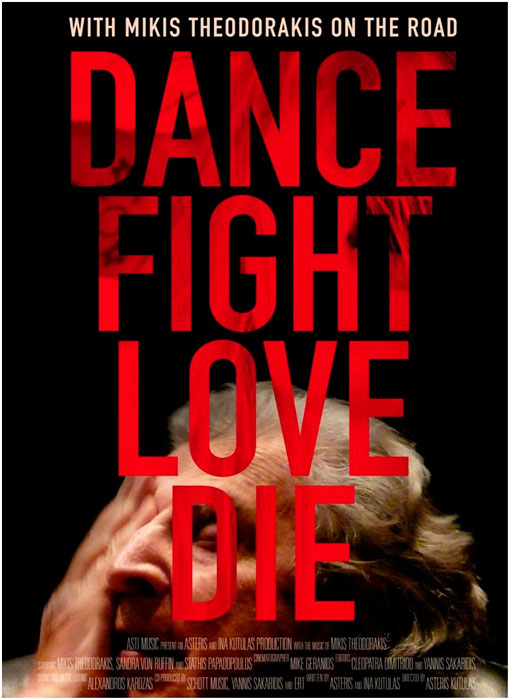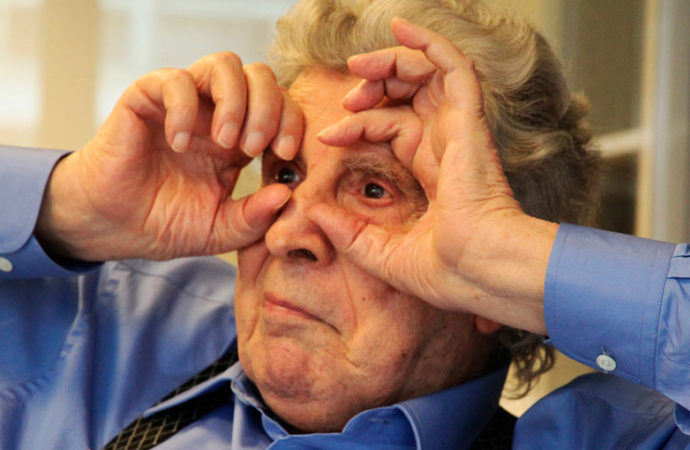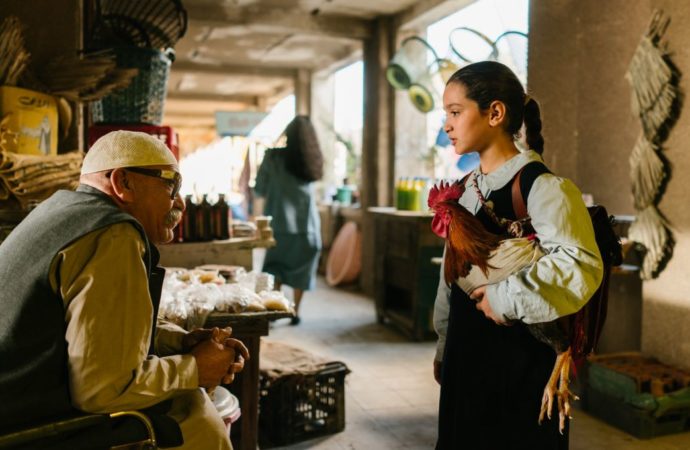There is currently a celebration of the life of Greek composer Mikis Theodorakis in Germany with a documentary film which is having screenings in selected cinemas. Being that both the composer and director have had big connections with Germany, it seemed the most appropriate or obvious place to celebrate his life and work outside of Greece. Although a global name as a composer, Theodorakis also enjoys a fanatical cult following, earning him the stature of a living legend who is still working today into his tenth decade. It was intended for him to come in person for the premiere in Berlin in May but he couldn’t make it, so he sent a special video introduction instead.
When one has to account for all the footage they have acquired since 1987, filming the legendary composer travelling and working on tour, condensing all that into less than 90 minutes was not an easy task. However, this is a exactly what director Asteris Kutulas set for himself and the results are the film Dance Fight Love Die – With Mikis Theodorakis on the Road (2017), a record of time the director has spent with Theodorakis on the road from 1987 to the present, organizing more than 150 concerts in 100 locations, in places as diverse and far and wide as Canada, Chile, Russia, Israel, South Africa, Turkey, Australia and most European countries, amounting to over 600 hours of footage. In that period he has also worked with Theodorakis on the production of around 30 music CDs for his global fan base.
Ultimately, the documentary plays like snippets or teaser trailers cut together. Every inclusion seemed like a dramatic advert for a concert in a particular place at a particular time. Linking all these clips into 87 minutes made for big decisions and attempts at lucid seamlessness. The latter was always going to be difficult and sometimes the edits did jar or grate and “fictional footage” of the composer parodying himself in an attempt by the director to link everything for humorous effect was not always tangible, or even appropriate, perhaps better considered as candid fun for fans to enjoy.
The beginnings of what became this legend, that has inspired such attention and devotion to Mikis Theodorakis, were on the Greek island of Chios, the future composer then spending his childhood years in different provincial Greek cities. His father was a lawyer from Crete and his mother came from an ethnic Greek family in Çesme, what is today Turkey. He was raised on Greek folk music as a child and so his fascination with music began, but he was more fascinated with the stars in the sky and becoming one with them. He taught himself to write his first songs without access to musical instruments, being influenced by Byzantine liturgy, and was already talking about becoming a composer.

Dance Fight Love Die – With Mikis Theodorakis on the Road (Asteris Koutoulas, 2017)
From these early years, his interests in music and politics seemed to go hand in hand. He took musical lessons in Patras and Pyrgos then gave his first concert at the age of seventeen in Tripoli. In Athens in 1943 he joined the Reserve Unit of ELAS, leading the fight against the British and the Greek political right-wing. During the subsequent Greek Civil War he was arrested and exiled on the island of Icaria and then deported to the island of Makronisos, being tortured and twice buried alive. Still, he found time from 1943-1950 to study at the Athens Conservatoire under Filoktitis Economidis. After finishing his studies in 1950, he went to Crete where he founded his first orchestra, then travelled with his young wife Myrto Altinoglou to Paris; the years 1954–1959 being his second period of musical writing, studying musical analysis under Olivier Messiaen at the Conservatory and conducting under Eugene Bigot.
During this period his symphonic works received international acclaim and he won the Gold Medal in the Moscow Music Festival in 1957. Two years later followed a successful performance of Theodorakis’s ballet Antigone at Covent Garden in London, for which he would be nominated in the U.S. as the Best European Composer of the Year. His first international scores for the film Ill Met by Moonlight (1956) and Honeymoon (Luna de Miel, 1959) by Michael Powell and Emeric Pressburger (first film only), were also very successful, so much that The Beatles were to use the Honeymoon title song as part of their repertoire.
Theodorakis returned to Greece and his roots in 1960 composing the song cycle Epitaphios, so beginning the third period of his composing and contributing to a cultural revolution in his home country. Notable works based on Greek and world poetry included: Epiphania (Giorgos Seferis), Little Kyklades (Odysseas Elytis), Axion Esti (Odysseas Elytis), Mauthausen (Iakovos Kambanellis), Romiossini (Yannis Ritsos), and Romancero Gitano (Federico García Lorca). His platform was to try and give back to Greek music a dignity which he felt it had lost, and he developed what he considered to be “metasymphonic music” (symphonic compositions that go beyond the “classical” status and mix symphonic elements with popular songs, Western symphonic orchestra and Greek popular instruments).

Dance Fight Love Die – With Mikis Theodorakis on the Road (Asteris Koutoulas, 2017)
After forming the Little Orchestra of Athens and the Musical Society of Piraeus, Theodorakis gave many concerts all around Greece and abroad. In tandem he was also involved with the politics of his home country. After Gregoris Lambrakis assassination in May 1963 he founded and became first president of the Lambrakis Democratic Youth (Lambrakidès). Under him it became a vast cultural renaissance and political movement with over 50,000 members. The following year Theodorakis became a member of the Greek Parliament, associated with the left-wing party EDA but he would be blacklisted as a composer by the cultural establishment because of his political ideals and many songs were censored before recording or omitted from radio stations.
However, he countered that with arguably his biggest artistic glory when in 1964 he wrote the music for the Michael Cacoyiannis film Zorba the Greek. The main theme, inspired from old Cretan traditional dances (Syrtaki), has subsequently become a trademark for Greece. Following this universal popularity for Zorba the Greek, Theodorakis did the film scores for Z (1969), and Serpico (1973). He also composed the Mauthausen Trilogy (The Ballad of Mauthausen) in 1966, a cycle of four arias which has been described as the most beautiful musical work ever written about the Holocaust and possibly his best work. Meanwhile, he consistently opposed oppressive regimes and was a key voice against the 1967–74 Greek junta, which immediately imprisoned him.
Theodorakis is now widely considered to be Greece’s best-known living composer. His award of the Lenin Peace Prize came because of his leftist politics and long association with the Communist Party of Greece. He was an MP for the KKE from 1981-90 but somewhat surprisingly ran as an independent candidate within the centre-right New Democracy party in 1989, his intentions being for the country to emerge from the political crisis after the scandals during the government of Andreas Papandreou and he wanted to establish a large coalition between conservatives, socialists and leftists. In 1990 he was elected to the parliament (like in 1964 and 1981), became a government minister under Constantine Mitsotakis, and fought against drugs and terrorism and for culture, education and better relations between Greece and Turkey. He continued to speak out in favour of left-liberal causes, Greek–Turkish–Cypriot relations, and against the War in Iraq.
Active since 1943, Theodorakis must be one of the few artists alive that was working before WW2 and is still doing so to this day. For the screenings in Germany it was even intended for the composer to turn up and introduce the films in person as well as being available for Q&A afterwards. In the end he sent a videotaped message but much of the makers of the film, including the director, were in person to share their stories on Mikis and the film. The enthusiasm and excitement of having the film finished and released totally resonated throughout its screening in Berlin. Although this is a must for the fans that will recognise some or all of the footage and music, others may be indifferent and some might think they are watching the editing style of Koyaanisqatsi (Life out of Balance, 1982) surreally interspersed with music and images of the composer, replacing Philip Glass music and first versus third world images. What is in no doubt is the energy and enthusiasm and deservedly making someone 92 years young and counting still seem contemporary.

Dance Fight Love Die – With Mikis Theodorakis on the Road (Asteris Koutoulas, 2017)
Director Asteris Kutulas was born in 1960 to Greek political immigrants in Romania and the German connection comes from his family moving to East Germany in 1968. Graduating from Dresden’s Kreuzschule, Kutulas went on to study German Literature and History of Philosophy at Leipzig University. From 1980 to 2000, he was working with Mikis Theodorakis, producing around 30 music CDs and organizing more than 150 concerts (e.g., in Canada, Chile, Russia, Israel, South Africa, Turkey, Australia and most European countries). During this time he has also translated numerous works of notable Greek authors into German (the likes of Cavafy, Elytis, Seferis and Ritsos). In what ultimately led to productions of films like Dance Fight Love Die, Kutulas has produced more than 40 mega events worldwide since 1999, working with various artists like Mike Oldfield, Scorpions, Motörhead, Klaus Schulze, Buena Vista Social Club and Westbam on video and TV music productions. Furthermore, he has served as author and director of several documentary film productions as well as being dramatic advisor on theatre and opera productions. The film Recycling Medea (2014) was his first feature cinema movie, and now follows the documentary on Theodorakis, who will be 93 years old at the end of July this year.
After its premiere in Berlin in early May, Dance Fight Love Die – With Mikis Theodorakis on the Road continues to play in Germany (and Vienna) throughout June and July then takes a break before it plays in German cinemas again in November.









No one has posted any comments yet. Be the first person!